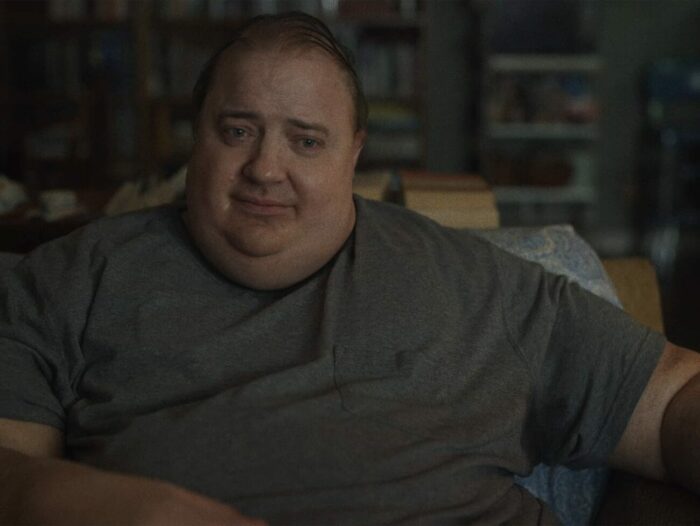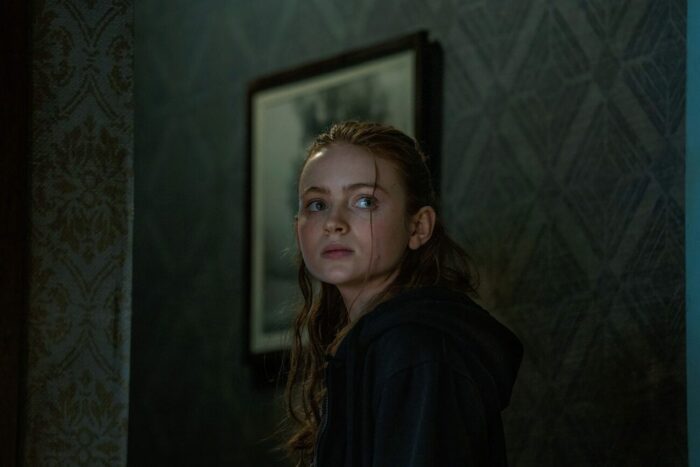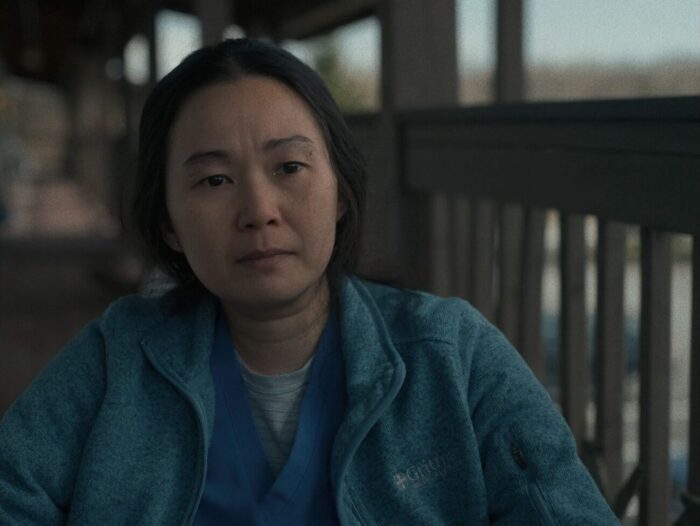Halfway through reading Samuel D. Hunter’s play, The Whale, after hearing about Darren Aronofsky’s plans for a film adaptation, I suddenly found myself asking one very particular question: “How exactly does this play match with Aronofsky’s sensibilities?” The conclusion I eventually reached was more interesting than I expected. For a filmmaker who’s built his reputation off stories about self-destruction—the harrowing masterpiece of an anti-drug PSA that is Requiem for a Dream, the obsessive downward pirouettes of Black Swan, and the misanthropic biblical allegory built into mother!—here was a story that wanted to transcend that and concern itself more with redemption than anything else, a closer analogue to The Wrestler that still dealt its hand in compassion and melodrama rather than that film’s stark dedication to realism. Above all else, Aronofsky dealing with this kind of emotionally oriented material seemed to be, more than anything else, a significant change in pace, one that was a gentler expansion of the typical thematic foundations and expectations of his filmography.
But Aronofsky is also a director whose insistence on eschewing subtlety has served as both his greatest asset and his most crippling weakness—the latter of which has largely leaked into his latest film, The Whale, an incredibly straightforward and heart-on-its-sleeve drama touching on countless potentially striking themes, whose symbols and emotional beats are so thuddingly obvious that the film is only saved by the grace and skill of its ensemble cast of performers. In particular, we’ve seen over the past few months as the world’s turned its praise and attention to Brendan Fraser, whose lead performance in this film is so radiant that all of said praise is deeply deserved, not to mention emotionally rewarding for an actor whose grand return to form has been long overdue. Yet for a story that preaches so often about the need for unfiltered honesty, Fraser and the cast are the only real sources of it—everything else about The Whale tries so hard to impress that honesty on its audience that it muddies and partially harms its authenticity in the process.

Hunter’s original text is largely grafted exactly as it is onto a cinematic format with Aronofsky’s film, telling the story of a severely obese man named Charlie, whose deeply troubled past, family life, and struggles with his sexuality and religion have led to an eating disorder that’s put him on the precipice of death. He learns about this very early on in the film through his close friend and caretaker, Liz (Hong Chau), who informs him that his blood pressure is 238 over 134, and that if his newfound congestive heart failure persists, it will end up killing him before the weekend arrives. Unwilling to go to the hospital, Charlie has all but essentially left himself in a state of passive suicide, a manifestation of the maelstrom of guilt in his life that he intends to resolve within the week by reconnecting with his embittered, long-estranged daughter Ellie (Sadie Sink), all while his past is bluntly peeled open by the various people who come in and out of his apartment, each of whom broadly stand in for different aspects of his life up until this point.
Given the story’s theatrical roots, it comes as virtually no surprise that The Whale is largely composed of a series of dialogues, the vast majority of which are one-on-one scenes between Charlie and one of the supporting cast. First among them is Thomas (Ty Simpkins), a young, self-purported Mormon missionary from a church called New Life, who eagerly views Charlie as a potential candidate for the Christian salvation he’s trying to help others reach, ultimately clashing with Charlie’s bleak experiences with Christianity. Liz, as it turns out, isn’t just Charlie’s caretaker, but also the sister of his late lover, Alan, who died by suicide after an unsettling encounter with New Life, and who Charlie had left his wife Mary (Samantha Morton) and Ellie for, something that’s left the latter with a deeply rooted rage that she venomously spews at everyone around her, and which Charlie tries to see through as an angst-doused veneer for the kindness he knows she is capable of.

It’s difficult not to notice the web of potential thematic complexity being spun here, juggling ideas of shame, sexuality, religion, broken families, and so on that, if intertwined elegantly, could have served as the foundation for something revelatory. But it’s important to note here that a major narrative throughline The Whale frequently circles back to is the fact that Charlie is a university English teacher—he guides his classes through video calls, but deliberately leaves his camera off to hide his appearance, claiming instead that it’s because of a broken webcam. As he reads his students’ essays, he makes no shortage of lectures about the importance of the honesty and “truth” behind their argument, a mode of proselytizing that Charlie himself seems to buy into over the course of the story. The frequency with which The Whale highlights this need for unfettered honesty, however, only highlights how sorely lacking it is in anything that resembles true emotional authenticity, which ideally comes from the stuff in between the lines, instead using its characters as soapboxes for thin platitudes and blunt symbolic representations of these aforementioned themes that its stellar cast of actors elevate just above the surface level.
Credit where credit is due—not a single performer in this film delivers a lacking performance. Even Sink and Simpkins, whose relative inexperience with such deeply present dramatic roles might make them liabilities, deliver exactly the right amount of emotional weight for their characters to function as they should. Chau and Morton are the supporting-actress highlights here; the former brings a nuanced dimension to the emotional complexity behind Liz’s sustained support for Charlie and her personal ties to him, while the latter makes excellent use of the single scene she’s offered to give the audience a harrowing look at the chasm of pain left behind by Charlie’s sudden extramarital departure for another man all those years ago.
Fraser, of course, is exactly as excellent as you’ve likely heard at this point, evidently harnessing real-life pain from the darker moments of his life into this nuanced, heartwarming, and at times deeply powerful performance that comes as close to a complete portrayal of a character that this script can offer. Fraser does his best to singlehandedly run the full emotional gamut instead of wallowing in misery, delivering moments of laugh-out-loud levity as well as profoundly affecting instances of genuine regret and pain with absolutely shocking line deliveries for what would otherwise be dull, clichéd remarks. It’s truly wonderful to see him find an opportunity for a fantastic, bravura comeback performance through this film, making it that much more of a shame he isn’t in a subtler film with a better script.

A single look beyond these great performances almost instantly reveals the simplicity of the ideas these characters embody in Hunter’s screenplay. Hardly any of the supporting characters outside of Charlie have an extra layer of nuance to how they initially present themselves, all of whom arrive to Charlie’s apartment in order to verbally lecture and clearly explicate the specific aspects of his life they represent—Thomas being a reflection of his past with religion, Ellie and Mary reminding us of his past with his now-embittered family, Liz partially serving as a look at his medical history and his sexuality—directly at him. It also barely helps that the symbolism and religious allegory mentioned here function in much the same way as the characters do, with books like Moby Dick, specific Bible verses, and even a Christlike tale of redemption that the director of Noah and mother! would so clearly be drawn to, but which he wields with nearly the same degree of telegraphed obviousness that those two films did. The issue is the incongruity between approaches to metaphor; Noah and mother! are stories that have obvious, bludgeoning symbolism baked into their integrally religious narrative foundations. The Whale‘s structure and tone, in contrast, almost desperately demand empathy, interiority, and complexity, which neither Hunter nor Aronofsky seem to properly grasp, try as they might to aspire to that “honesty” by playing up melodramatic contrivances.
The end result of that incongruity is a film that preaches empathy and honesty, but whose overall execution fails to reach the heights that the talents standing behind and in front of the camera are fully capable of. For one, Matthew Libatique’s cinematography uses a 4:3 aspect ratio, but fails to emphasize its potential for closeness and intimacy, instead only highlighting its capacity for claustrophobic framing, a strange choice for a story that purports to express the former in dealing with depictions of Charlie’s obesity. Meanwhile, Rob Simonsen’s swelling, often overbearingly emotional score also plays strangely unsettling, low melodies whenever Charlie struggles to carry himself from one place to another or engages in self-destructive behaviors, inadvertently making a spectacle out of the physical and emotional struggles resulting from his weight.
For all the talk that Aronofsky, Hunter, and Fraser have done about The Whale‘s altruistic and empathetic goals, the significantly adverse reactions to it that have emerged, most prominently from fat acceptance and advocacy groups, is the unfortunate result of a shrill clash between intention and execution that results in what many understandably see as nothing more than pitying histrionics derived from both fat and queer suffering. It’s a film that clearly wants to be an emotionally complex tale of shame, fatness, sexuality, religion, and broken families, and whose wonderful cast is the closest it gets to reaching those intentions, but doesn’t quite have the vocabulary or the emotional breadth to meaningfully discuss these ideas—much like the middling essays that Charlie would earnestly want to help out with.



